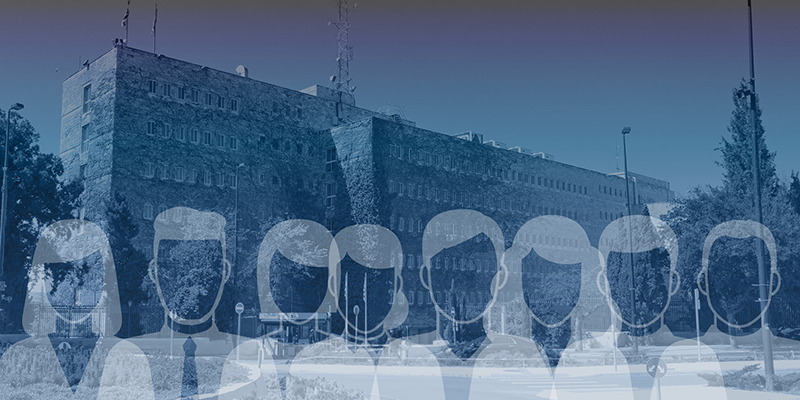Vaccine Vulnerability: Sharp Decline in Infant Vaccination Rate Leaves Israel Exposed
In Safed, Jerusalem and Beit Shemesh, the rate of infant vaccination against measles, mumps and rubella dropped by 15 percent between 2018 and 2022. Across the general population, vaccination coverage has fallen by up to 6 percent and Israel finds itself at the bottom of the ranking of developed nations. Why has there been such a marked decline in ultra-Orthodox society? The Ministry of Health admits that it can’t keep up with the birthrate. A Shomrim exclusive


In Safed, Jerusalem and Beit Shemesh, the rate of infant vaccination against measles, mumps and rubella dropped by 15 percent between 2018 and 2022. Across the general population, vaccination coverage has fallen by up to 6 percent and Israel finds itself at the bottom of the ranking of developed nations. Why has there been such a marked decline in ultra-Orthodox society? The Ministry of Health admits that it can’t keep up with the birthrate. A Shomrim exclusive

In Safed, Jerusalem and Beit Shemesh, the rate of infant vaccination against measles, mumps and rubella dropped by 15 percent between 2018 and 2022. Across the general population, vaccination coverage has fallen by up to 6 percent and Israel finds itself at the bottom of the ranking of developed nations. Why has there been such a marked decline in ultra-Orthodox society? The Ministry of Health admits that it can’t keep up with the birthrate. A Shomrim exclusive
Those photographed are not related to the article. Photo: Shutterstock

Uri Blau
February 2, 2025
Summary


Listen to a Dynamic Summary of the Article
Created using NotebookLM AI tool
Ministry of Health data obtained by Shomrim, which is being published here for the first time, shows that Beit Shemesh, Jerusalem, and Safed sit atop the table of Israeli cities with the lowest proportion of infants being given routine vaccinations. The data, which covers infants born in 2022 – the most recent year for which figures exist – shows that the rate of vaccination against measles, mumps and rubella stood at 79 percent in Beit Shemesh, 80 percent in Jerusalem and 82 percent in Safed. This represents a drop of around 15 percent compared to infants born in those cities in 2018.
The figures also show a continued drop in the rate of vaccination elsewhere in Israel: in 2022, 90 percent of infants were vaccinated against diphtheria, tetanus, polio, and whooping cough, compared to 93 percent of those born in 2018. There was also a drop recorded in the proportion of infants receiving vaccinations against measles, mumps, and rubella: from 94 percent of infants born in 2018 to just 88 percent in 2022.
From the data alone, it is hard to gauge whether the global and local discourse about vaccinations, which grew exponentially after the coronavirus pandemic, has influenced the trend in Israel. In Tel Aviv and the Sharon region, for example, there was almost no difference in the rate of vaccination against diphtheria, tetanus, polio, and whooping cough between 2018 and 2022, but there was a drop in the proportion of parents giving their babies the vaccinating their babies against measles, mumps, and rubella (the MMR vaccine).
“All it takes is for there to be one place in Israel where the vaccination coverage for measles is inadequate and there will be an outbreak that will spread to other places – even places with higher vaccination coverage,” Prof. Hagai Levine explains.

One bright spot to emerge from the figures relates to the vaccination rate in areas with a large Arab population. For example, 98 percent of the infants born in Nazareth in 2022 received the MMR vaccine and there are similar figures from the mixed Jewish-Arab city of Acre. The overall picture, however, remains of concern, given that the vaccination rate in Israel is lower than in most developed countries. According to figures from the Organization for Economic Co-operation and Development (OECD), there are only five countries in the world – Austria, Slovenia, Colombia, New Zealand and Estonia – which have a lower vaccination rate for diphtheria, tetanus, polio and whooping cough.
Prof. Hagai Levine, an expert in public health and chair of the Israel Association of Public Health Physicians, tells Shomrim that the figures represent only a partial picture and “the situation is actually even worse.” According to Levine, the figures do not include the age at which the vaccine is given, even though experts have identified a trend whereby parents give their children vaccines after the recommended age. Some, for example, wait until five months, rather than the recommended two months. Levine explains that administering the vaccine after the recommended age also negatively affects the population’s vaccine coverage. He adds that epidemics and pandemics start with the weakest link in the population, places where the vaccination coverage is especially low. He also wants the Ministry of Health to provide data at a higher resolution, with information about every neighborhood. “All it takes is for there to be one place in Israel where the vaccination coverage for measles is inadequate and there will be an outbreak that will spread to other places – even places with higher vaccination coverage,” he explains.
“When you combine these figures with what is happening in reality, you see that we have gone from being a country with excellent vaccination coverage, on the front line of virus protection, to a vulnerable society that could be protected with vaccines.”
‘Vaccines are not seen as urgent’
The data obtained by Shomrim also indicates that the vaccination situation is especially dire in cities with a large ultra-Orthodox population. A study published by the Israel National Institute For Health Policy Research sought to find the reason for this and examined the barriers and enablers to vaccines in ultra-Orthodox society. The study, which was presented at the Institute’s 2023 annual conference, found that “the main impediments to vaccination in the ultra-Orthodox community are logistical, even if this sometimes also includes religious framing.” The study recommended establishing “tailored and specific intervention plans (…) to protect the community and the rest of the population against repeated outbreaks of preventable diseases, by means of vaccines.” These planes, according to the study, cannot rely solely on rabbis’ coming out in support of vaccinations.
“in principle, there is no real religious opposition to vaccines, even though the opposition will sometimes be couched in religious terms.” Beyond this, “you come across the concerns expressed by the general population," says Avi Yacobson.

Avi Yacobson, a clinical psychologist and doctoral student at Bar-Ilan University’s Department of Public Health, was one of the authors of the study and his thesis deals with vaccine enablers for the ultra-Orthodox community in Safed. In a conversation with Shomrim, he explains that different streams within ultra-Orthodox Judaism have differing approaches to the issue of vaccines, but he adds that “in principle, there is no real religious opposition to vaccines, even though the opposition will sometimes be couched in religious terms.” Beyond this, “you come across the concerns expressed by the general population. People ask about how safe vaccines are, whether the pharmaceutical companies have an interest and so on.”
According to Yacobson, the lack of access to vaccines, families with many children and a sense that “vaccines are not seen as something urgent” mean that the coverage is markedly lower in ultra-Orthodox communities.
Levine agrees that action needs to be taken to make vaccines more accessible. He says that the family health clinics in ultra-Orthodox neighborhoods are often isolated, understaffed, and open at times that do not suit the population. All of this, he says, has a negative impact on vaccine coverage. Among his recommendations is that the Ministry of Health operate mobile vaccination units and that vaccination centers open at night. “The current trend obliges us to come up with a national plan of action; we need real-time access to data, and we need the cooperation of various plaטers, including within different populations, so that we can deal with the problem over time.”
Ministry Of Health: We can’t keep up with the birth rate
Shomrim asked Minister of Health Uriel Buso (Shas Party) for his comments on the issue. Instead, the party issued a statement in his name: The minister of health is working to bridge the gaps in every city and town with high birth rates, given the shortage of family health clinics, by bolstering mobile vaccination stations in Jerusalem and investing resources in Beit Shemesh, as well as in the framework of a program to promote health services in Arab society and the ultra-Orthodox sector, as well as efforts to increase the number of nurses and the availability of services in the relevant places.
“The minister has called several times in various forums and called on the general public to get vaccinated, which can prevent disease and save lives.”
.jpeg)
The Ministry of Health responded that “the issue of low vaccination coverage among population groups in Jerusalem and the Jerusalem District is the main focus of Jerusalem Municipality’s Public Health Division, the Jerusalem District of the Ministry of Health, and the Public Health Division of the Ministry of Health. The decline in coverage in the Jerusalem District compared to other areas stems from the very rapid population increase, against the backdrop of a high birth rate, which exceeds the rate of expansion of the services. We are working to expand availability and accessibility for these populations.
“In general, the Ministry of Health works constantly to increase the vaccination rate for all routine vaccines among children, in order to proactively reach children who are not vaccinated, in accordance with the vaccination program. For example, the Ministry of Health and Jerusalem Municipality are collaborating to ensure active access to routine vaccinations. In Beit Shemesh, a mobile family health clinic is also starting to operate in the ultra-Orthodox neighborhoods, and at the same time, efforts and activities are being carried out to promote health and information within these communities, in cooperation with representatives from the communities themselves.
“Moreover, efforts are being made to increase the number of nurses at the family health clinics; 10 additional nursing positions have already been approved in the Jerusalem District, in addition to 11 positions at Jerusalem Municipality, in order to make the services more accessible.”













